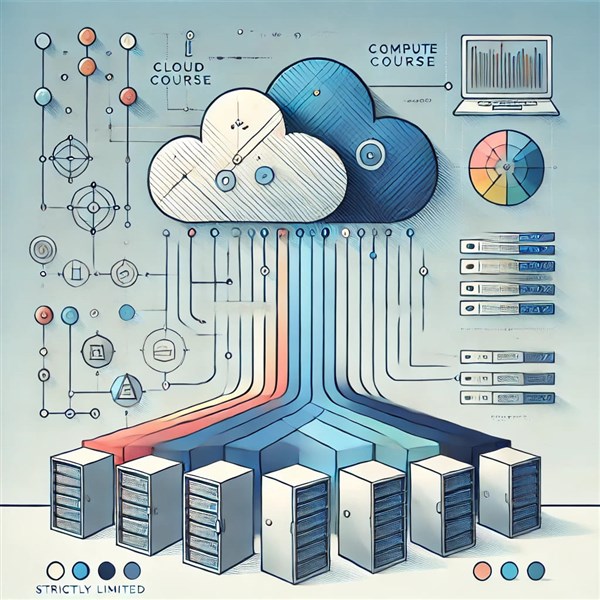
In the digital age, computing knowledge is more vital than ever. Whether you're looking to break into the IT field, expand your technical skills, or pursue a career in emerging technologies, a compute course provides the foundational knowledge necessary to succeed. Compute courses cover a wide array of subjects, from cloud computing and data centers to computational theory and system architecture. In this guide, we’ll delve into the key concepts you can expect to learn in a compute course and how these skills set the stage for a successful career in technology.
Key Concepts You’ll Learn in a Compute Course
1. Cloud Computing: The Future of IT Infrastructure
One of the core topics taught in compute courses is cloud computing. This revolutionary technology allows businesses to store, manage, and process data over the internet, rather than relying on traditional on-premise systems. With the increasing reliance on cloud services like AWS, Microsoft Azure, and Google Cloud, cloud computing knowledge has become a must-have skill for IT professionals.
In a compute course, you'll learn about the three main models of cloud computing:
- Infrastructure as a Service (IaaS): This allows users to rent virtual machines and other infrastructure elements, enabling the creation of custom environments without maintaining hardware.
- Platform as a Service (PaaS): Focuses on providing software platforms where developers can create applications without managing the underlying hardware.
- Software as a Service (SaaS): Delivers software applications over the cloud, such as email, CRM systems, and collaboration tools.
Additionally, you'll explore topics like cloud deployment models (public, private, and hybrid clouds) and cloud security, learning how to ensure that data and applications are secure and efficient in a cloud-based environment.
2. Data Centers: The Backbone of the Digital World
Another fundamental topic you will encounter in a compute course is data centers. These are physical or virtual facilities used to house computer systems and associated components, such as telecommunications and storage systems. They are the backbone of modern internet services, supporting everything from e-commerce platforms to social media networks and cloud storage solutions.
In your course, you'll gain an understanding of:
- Data Center Architecture: How data centers are structured to handle vast amounts of data securely and efficiently.
- Networking in Data Centers: Learn about the network infrastructure that enables the data center’s smooth operation, including routing, switching, and load balancing.
- Virtualization: How data center resources are managed virtually to ensure optimal performance and scalability.
- Energy Efficiency and Sustainability: As environmental concerns rise, data centers are becoming increasingly energy-efficient. In a compute course, you will learn about green computing practices and how data centers are evolving to meet sustainability goals.
With this knowledge, you’ll be equipped to manage data center operations and understand the infrastructure that powers the cloud and various online services.
3. Computational Theory: The Foundation of Problem-Solving in Computing
A solid understanding of computational theory is essential for anyone looking to excel in the field of technology. This area of study focuses on the mathematical and theoretical aspects of computing, helping you develop the problem-solving skills needed to design efficient algorithms, understand complexity, and optimize processes.
Some key topics covered under computational theory include:
- Algorithms: The study of step-by-step procedures for solving problems, ranging from simple sorting algorithms to more complex data-searching and optimization techniques.
- Complexity Theory: Learn about the computational complexity of problems, understanding which problems can be solved efficiently (in polynomial time) and which require exponential time (NP-hard problems).
- Turing Machines and Automata Theory: Theoretical models for computation that define what is computable and the limits of computational power.
- Formal Languages and Grammars: The study of syntactical structures used to define the set of possible programs or computer instructions.
Through these concepts, you’ll develop critical thinking and problem-solving skills, allowing you to tackle complex technical challenges with confidence.
4. System Architecture and Operating Systems: Building the Foundation of Computing
System architecture refers to the design and structure of computer systems, including both hardware and software components. In a compute course, you’ll explore how hardware elements such as processors, memory, and storage interact with software to form efficient systems.
Some key topics include:
- Processor Architecture: Learn how CPUs process instructions, including topics like pipelining, parallel processing, and memory hierarchy.
- Memory Management: Understand the different types of memory (RAM, cache, virtual memory) and how they are utilized to optimize performance.
- Input/Output Systems: Study how data is transferred between the computer’s hardware and external devices such as keyboards, displays, and storage devices.
- Operating Systems: Gain a deep understanding of how operating systems manage hardware resources, handle multitasking, and provide user interfaces. You'll also learn about file systems, system calls, process management, and security mechanisms.
By understanding system architecture and operating systems, you’ll be able to design more efficient computer systems and troubleshoot hardware or software issues.
5. Networking Fundamentals: Connecting Systems Across the Globe
In any compute course, learning about networking is crucial. Networking refers to the connection of computers and devices to exchange data, and its principles underpin the entire digital ecosystem. You'll learn about:
- TCP/IP Protocol Suite: The foundation of internet communication, including key protocols like IP (Internet Protocol) for addressing and TCP (Transmission Control Protocol) for ensuring reliable data transmission.
- Routing and Switching: Study how data is directed through networks, ensuring that it reaches its destination efficiently.
- Network Security: Learn the strategies for securing data as it travels across networks, including encryption, firewalls, and intrusion detection systems.
Networking knowledge is essential for building scalable, reliable, and secure systems, making it a critical skill for anyone working in IT infrastructure or cloud computing.
6. Security and Compliance: Protecting the Digital World
As cyber threats continue to evolve, understanding security and compliance has become essential in the computing field. In a compute course, you’ll learn about:
- Cryptography: Techniques used to secure data, including encryption and hashing algorithms.
- Authentication and Authorization: Methods to ensure that only authorized users can access sensitive data and systems.
- Security Best Practices: How to implement security policies to protect systems from threats such as malware, phishing, and data breaches.
- Regulatory Compliance: Understand the legal frameworks and standards like GDPR, HIPAA, and PCI-DSS that organizations must comply with to ensure data privacy and security.
These security skills are indispensable in any computing field, whether you're working on cloud infrastructure, software development, or IT management.
Conclusion: Equipping Yourself for a Career in Technology
A compute course equips you with a vast array of skills that are critical in today’s technology-driven world. Whether it’s cloud computing, data centers, system architecture, or networking, each of these subjects lays the groundwork for building, managing, and securing modern computer systems. Additionally, concepts in computational theory, security, and compliance will ensure that you can not only build robust systems but also ensure they’re efficient, scalable, and secure.
By enrolling in a compute course, you're taking a significant step toward a career in IT, software engineering, cloud architecture, or data science. These skills are in high demand, and professionals who understand the complexities of computing are poised for long-term career growth in an ever-evolving technological landscape.
Koenig Solutions is a leading IT training company offering a range of compute courses that are tailored to meet the needs of learners at different stages of their career.







COMMENT